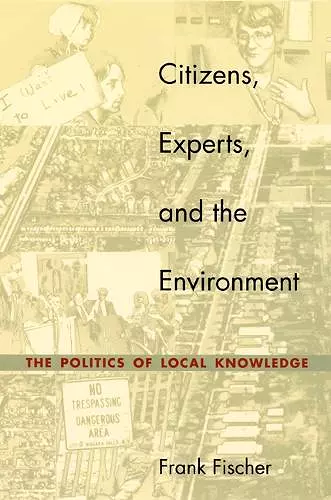Citizens, Experts, and the Environment
The Politics of Local Knowledge
Format:Paperback
Publisher:Duke University Press
Currently unavailable, and unfortunately no date known when it will be back

Claims that the problematic communication gap between experts and ordinary citizens is best remedied by a renewal of local citizen participation in deliberative structures.
The tension between professional expertise and democratic governance has become increasingly significant in Western politics. Environmental politics in particular is a hotbed for citizens who actively challenge the imposition of expert theories that ignore forms of local knowledge that can help to relate technical facts to social values.
Where information ideologues see the modern increase in information as capable of making everyone smarter, others see the emergence of a society divided between those with and those without knowledge. Suggesting realistic strategies to bridge this divide, Fischer calls for meaningful nonexpert involvement in policymaking and shows how the deliberations of ordinary citizens can help solve complex social and environmental problems by contributing local contextual knowledge to the professionals’ expertise. While incorporating theoretical critiques of positivism and methodology, he also offers hard evidence to demonstrate that the ordinary citizen is capable of a great deal more participation than is generally recognized. Popular epidemiology in the United States, the Danish consensus conference, and participatory resource mapping in India serve as examples of the type of inquiry he proposes, showing how the local knowledge of citizens is invaluable to policy formation. In his conclusion Fischer examines the implications of the approach for participatory democracy and the democratization of contemporary deliberative structures.
This study will interest political scientists, public policy practitioners, sociologists, scientists, environmentalists, political activists, urban planners, and public administrators along with those interested in understanding the relationship between democracy and science in a modern technological society.
“For the student of environmental science and its relationship to public policy, this book is invaluable for its broad bibliographic base and its careful and elegant theoretical reasoning.” - Helen Ingram, Environment
“[A] well-crafted critique of expertise and neopositive social science. . . . Citizens, Experts, and the Environmental Studies synthesizes the most important work on lay ways of knowing and makes major theoretical contributions to the field. . . . This is an ideal book . . . .” - David N. Pellow, Contemporary Sociology
"[A] more fundamental and more scholarly critique of the role of science in environmental policy. . . . [R]eaders . . . are rewarded by learning a great deal about the subject through clear, well-written prose."
- Helen Ingram & Bryan McDonald, Natural Resources Journal
"[A] commendably ambitious book which does not simply make the conventional case for democracy but also explores wider issues of epistemology and the status of expertise. . . . [A]n important contribution to the contemporary discussion over citizenship and expertise." - Alan Irwin, Environment and Planning A
“Citizens, Experts, and the Environment is real achievement. Building on his earlier work, Fischer presents a synthesis of a ‘postpositivist’ public policy approach and locates it clearly in contemporary environmental concerns and epistemology.”—Patsy Healey, Centre for Research in European Urban Environments, University of Newcastle
“An impressive, interesting, and multifaceted work. Fischer provides the reader with a wide and fascinating range of theoretical and policy-oriented materials, weaves in real life problems of public participation (or lack thereof) from around the world, and effectively brings together important concerns.”—Alan Mandell, State University of New York, Empire State College
“This is a very carefully crafted work that asks critical questions rarely asked well in policy studies and utilizes literatures not typically read in policy analysis circles. In doing so, Fischer effectively challenges the dominant mode of organization in advanced industrial society. A masterfully-executed study.”—Timothy W. Luke, Virginia Polytechnic and State University at Blacksburg
“[A] well-crafted critique of expertise and neopositive social science. . . . Citizens, Experts, and the Environmental Studies synthesizes the most important work on lay ways of knowing and makes major theoretical contributions to the field. . . . This is an ideal book . . . .” -- David N. Pellow * Contemporary Sociology *
“For the student of environmental science and its relationship to public policy, this book is invaluable for its broad bibliographic base and its careful and elegant theoretical reasoning.” -- Helen Ingram * Environment *
"[A] commendably ambitious book which does not simply make the conventional case for democracy but also explores wider issues of epistemology and the status of expertise. . . . [A]n important contribution to the contemporary discussion over citizenship and expertise." -- Alan Irwin * Environment and Planning A *
"[A] more fundamental and more scholarly critique of the role of science in environmental policy. . . . [R]eaders . . . are rewarded by learning a great deal about the subject through clear, well-written prose."
-- Helen Ingram & Bryan McDonald * Natural Resources Journal *
ISBN: 9780822326229
Dimensions: unknown
Weight: 549g
352 pages